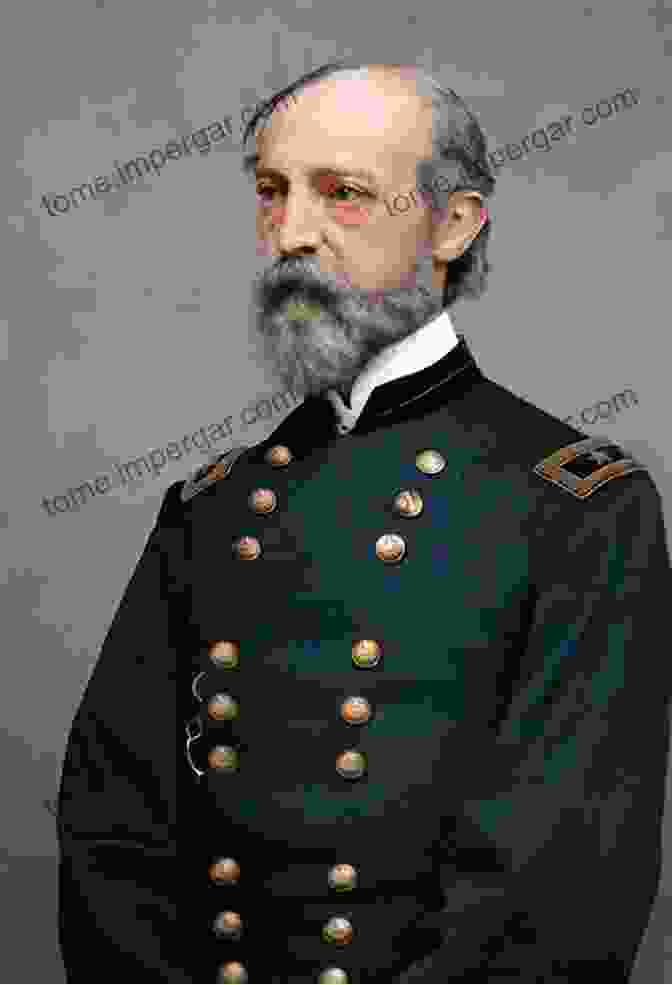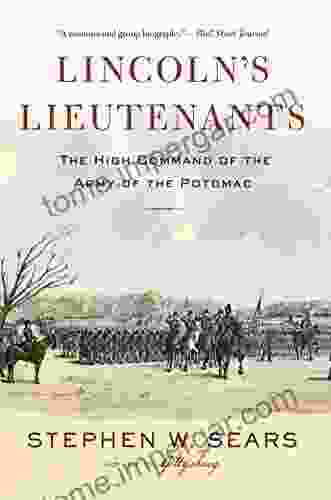Commanding the Union: The High Command of the Army of the Potomac

The Army of the Potomac, the Union's primary fighting force in the American Civil War, played a pivotal role in shaping the course of the conflict. Led by a succession of commanders, the army faced numerous challenges and setbacks, but ultimately emerged victorious. This article explores the high command of the Army of the Potomac, examining the strengths and weaknesses of its leaders and their impact on the war.
Early Commanders
The first commander of the Army of the Potomac was General Irvin McDowell, who led the army in the disastrous First Battle of Bull Run in July 1861. After McDowell's defeat, General George B. McClellan took command and spent the next year training and organizing the army. McClellan's cautious approach and reluctance to engage the enemy led to his replacement by General Ambrose Burnside in November 1862.
4.6 out of 5
| Language | : | English |
| File size | : | 129680 KB |
| Text-to-Speech | : | Enabled |
| Screen Reader | : | Supported |
| Enhanced typesetting | : | Enabled |
| X-Ray | : | Enabled |
| Word Wise | : | Enabled |
| Print length | : | 901 pages |
Burnside's disastrous defeat at the Battle of Fredericksburg in December 1862 further eroded the army's morale. He was replaced by General Joseph Hooker, who led the army to a narrow victory at the Battle of Chancellorsville in May 1863. However, Hooker's subsequent defeat at the Battle of Gettysburg in July 1863 led to his replacement by General George G. Meade.
George G. Meade
Meade, a professional soldier known for his meticulous planning and attention to detail, led the Army of the Potomac to its decisive victory at the Battle of Gettysburg. Meade's victory marked a turning point in the war and paved the way for the Union's eventual victory.

Meade remained in command of the Army of the Potomac until the end of the war. Under his leadership, the army fought a series of successful campaigns that culminated in the surrender of Confederate General Robert E. Lee at Appomattox Court House in April 1865.
Challenges Faced by the Army of the Potomac
The Army of the Potomac faced numerous challenges throughout its existence. These challenges included:
- Political interference: The army was often subject to political interference from President Abraham Lincoln and Secretary of War Edwin Stanton, who pressured commanders to take aggressive action even when they believed it was unwise.
- Lack of experience: Many of the army's commanders, including McDowell, Burnside, and Hooker, had little or no experience leading large armies in combat.
- Logistical difficulties: The army often faced logistical challenges, such as supplying its troops with food, ammunition, and medical care. These challenges were compounded by the vast distances involved in the war.
- Confederate opposition: The Army of the Potomac faced a determined and skilled opponent in the Confederate Army of Northern Virginia, led by General Robert E. Lee.
Strengths of the Army of the Potomac
Despite the challenges it faced, the Army of the Potomac also possessed several strengths that contributed to its eventual victory.
- Size: The Army of the Potomac was much larger than the Confederate Army of Northern Virginia, giving it a significant numerical advantage.
- Resources: The Union government provided the Army of the Potomac with ample resources, including food, ammunition, and medical care.
- Industrial capacity: The Union's superior industrial capacity allowed it to produce large quantities of weapons and supplies for the army.
- Morale: Despite its setbacks, the Army of the Potomac maintained high morale throughout the war, due in part to the leadership of its commanders and the support of the American people.
The high command of the Army of the Potomac played a crucial role in the Union's victory in the American Civil War. Despite facing numerous challenges, the army's commanders, including George G. Meade, led it to a series of successful campaigns that culminated in the surrender of the Confederate army. The Army of the Potomac's victory was a testament to the strength and resilience of the Union, and its commanders deserve credit for their leadership and determination.
4.6 out of 5
| Language | : | English |
| File size | : | 129680 KB |
| Text-to-Speech | : | Enabled |
| Screen Reader | : | Supported |
| Enhanced typesetting | : | Enabled |
| X-Ray | : | Enabled |
| Word Wise | : | Enabled |
| Print length | : | 901 pages |
Do you want to contribute by writing guest posts on this blog?
Please contact us and send us a resume of previous articles that you have written.
 Book
Book Novel
Novel Page
Page Chapter
Chapter Text
Text Story
Story Genre
Genre Reader
Reader Library
Library Paperback
Paperback E-book
E-book Magazine
Magazine Newspaper
Newspaper Paragraph
Paragraph Sentence
Sentence Bookmark
Bookmark Shelf
Shelf Glossary
Glossary Bibliography
Bibliography Foreword
Foreword Preface
Preface Synopsis
Synopsis Annotation
Annotation Footnote
Footnote Manuscript
Manuscript Scroll
Scroll Codex
Codex Tome
Tome Bestseller
Bestseller Classics
Classics Library card
Library card Narrative
Narrative Biography
Biography Autobiography
Autobiography Memoir
Memoir Reference
Reference Encyclopedia
Encyclopedia Bob Mangat
Bob Mangat Nina Hershberger
Nina Hershberger S Rafi Creation
S Rafi Creation Beverly Tetterton
Beverly Tetterton Christina Tosch
Christina Tosch Dhanasekharan Natarajan
Dhanasekharan Natarajan Cem Unsalan
Cem Unsalan Benjamin Carter Hett
Benjamin Carter Hett Bob Brier
Bob Brier Barbara London
Barbara London Barbara Lovenheim
Barbara Lovenheim Leanne Owens
Leanne Owens Bhakti Rakshak Sridhar
Bhakti Rakshak Sridhar Don Mcleese
Don Mcleese Charles D Bailyn
Charles D Bailyn Barbara Stabiner
Barbara Stabiner Bill Schutt
Bill Schutt Bence Nanay
Bence Nanay Casey Watson
Casey Watson Meghan E Strong
Meghan E Strong
Light bulbAdvertise smarter! Our strategic ad space ensures maximum exposure. Reserve your spot today!

 Jayson PowellMississippi Longest Civil War: A Historical Saga Unraveled in "Fred Morrison...
Jayson PowellMississippi Longest Civil War: A Historical Saga Unraveled in "Fred Morrison...
 Enrique BlairEmbark on a Linguistic Odyssey: Understanding English as Lingua Franca with...
Enrique BlairEmbark on a Linguistic Odyssey: Understanding English as Lingua Franca with...
 Blake KennedyWould You Rather Game: Eww Edition - The Hilarious Game for Kids, Teens, and...
Blake KennedyWould You Rather Game: Eww Edition - The Hilarious Game for Kids, Teens, and...
 Herman MitchellIndulge in the Delectable Trinity of Creme Delicacies: The Creme Brulee...
Herman MitchellIndulge in the Delectable Trinity of Creme Delicacies: The Creme Brulee... Eugene PowellFollow ·3.3k
Eugene PowellFollow ·3.3k Stephen KingFollow ·14.1k
Stephen KingFollow ·14.1k Bill GrantFollow ·12.6k
Bill GrantFollow ·12.6k Francis TurnerFollow ·19.6k
Francis TurnerFollow ·19.6k Justin BellFollow ·12.5k
Justin BellFollow ·12.5k Guillermo BlairFollow ·8.9k
Guillermo BlairFollow ·8.9k Alec HayesFollow ·17.9k
Alec HayesFollow ·17.9k Alex ReedFollow ·11.9k
Alex ReedFollow ·11.9k

 Edison Mitchell
Edison MitchellFrench Strategy and Operations in the Great War
An In-Depth Examination of Military Genius ...

 Harvey Hughes
Harvey HughesArts In Health: Designing And Researching Interventions
Delving into the...

 Walt Whitman
Walt WhitmanHealing and Hope for Those with Empty Arms
A Comprehensive Guide for Grieving...

 DeShawn Powell
DeShawn PowellUniversity of Maine Ice Hockey: A Legacy of Frozen Glory
Nestled in the heart of Maine, a state...

 George Hayes
George HayesControl For Aluminum Production And Other Processing...
In today's competitive manufacturing...

 Ben Hayes
Ben HayesThe Lost Obelisks Of Egypt: A Journey into the Depths of...
: The Enduring Allure of Egypt's Ancient...
4.6 out of 5
| Language | : | English |
| File size | : | 129680 KB |
| Text-to-Speech | : | Enabled |
| Screen Reader | : | Supported |
| Enhanced typesetting | : | Enabled |
| X-Ray | : | Enabled |
| Word Wise | : | Enabled |
| Print length | : | 901 pages |




